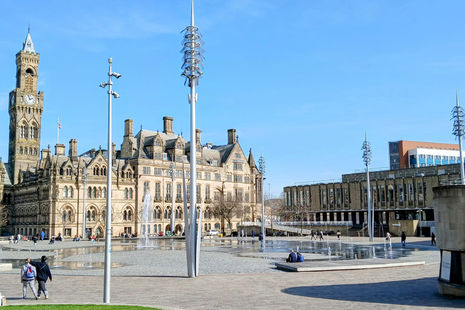Priestley, Dunbar, and Bradford too
Half-way through its year as City of Culture, Millie Wooler meditates on Bradford’s contributions to theatre

As I was walking through Bradford the other day, I found myself outside the Science and Media Museum. It was a classic rainy-day activity for me growing up, offering the opportunity to see yourself on BBC News, or even to meet a Dalek. But this time, I found something new outside, something that I had never noticed before. Larger than life, a statue of J.B. Priestley stares over his home city, his coat-tails billowing out in the wind.
Much has been changing in Bradford over the last year. Since the start of its tenure as City of Culture, the community has come together to re-write the reputation of their hometown. The newly-renovated Bradford Live has come together with other venues like St George’s Hall to promote the city’s contribution to the music industry. The Brontës have been highly-lauded for their contribution to literature. But it is the city’s contribution to the theatre that I find most intriguing.
“The city remained a part of him throughout his life”
Born in Manningham, J.B. Priestley would go on to write one of the most familiar plays of the modern era. It is hard to imagine a GCSE English syllabus that does not ask students to delve into the underlying inequalities of the industrial North Midlands town of Brumley. It may be sacrilegious to say so, but An Inspector Calls (1945) is as familiar to us as Shakespeare, and considerably more approachable for young audiences.
But our appreciation of a single play (glowing though my own reviews always are) has led to a dismissal of Priestley’s seemingly exhaustive other works. Even in trying to restrict myself to his plays, I find that the list is too long to provide a comprehensive coverage in such a short space. I must, therefore, limit myself to a brief comment on his innovation. He is famous for his Time Plays, which he structured around varying theories of time. It’s what makes An Inspector Calls so unsettling in the end; we cannot understand time in the way that we want to, so his plays push it to its extreme.
Although An Inspector Calls is set south of his home city, Priestley often drew on his experiences growing up in Bradford. The city remained a part of him throughout his life, and after; to this day, the city is proud to name him amongst its children. Something that greatly troubled him, however, was the gradual destruction of the city’s Victorian heritage by modern developers. Those buildings that remain are truly stunning remnants of the most intricate architecture of their age. What is left behind of the city Priestley knew speaks to why he held it so close to his heart, and why so many of us continue to do so.
“Bradford playwrights [are] unflinching in their beliefs”
However, Priestley was a comparatively well-off member of the Bradford community. He was lucky enough to become one of the first students to study the English Tripos at Trinity Hall, Cambridge. Some of this city’s other great talents were not so lucky. Andrea Dunbar took her difficult up-bringing and transformed it into three hard-hitting, realist plays: The Arbor (1977), Rita, Sue and Bob Too (1982), and Shirley (1986).
She wrote The Arbor (named after the part of Buttershaw council estate in which she grew up) whilst studying for her CSE English qualification. With the encouragement of her teacher, she revised it to a performance standard, and became the youngest playwright to have her work performed at London’s Royal Court Theatre. It was then quickly followed by Rita, Sue and Bob Too, made famous by Alan Clarke’s film of the same name, five years later.
Dunbar’s plays have never sat comfortably with audiences, least of all Rita, Sue and Bob Too whose film was particularly unpopular among her neighbours for its negative depiction of their estate. However, her plays are purposefully shocking and daring, allowing the audience no respite from the world that she saw day in, day out. Perhaps it is a key characteristic of Bradford playwrights to be unflinching in their beliefs. Priestley is often credited with being a key mover in the CND and Labour movements during and following the Second World War, and no-one needs reminding of Inspector Goole’s unerring moral compass.
Looking forward to the second half of Bradford’s tenure as City of Culture, I hope that this is an opportunity for the young people of the city to be reminded of the cultural whirlpool they find themselves in. Bradford is a city with so many stories waiting to be told, and so many voices waiting to tell them that it must become a hub of diverse theatrical talent in the years to come.
 News / Judge Business School advisor resigns over Epstein and Andrew links18 February 2026
News / Judge Business School advisor resigns over Epstein and Andrew links18 February 2026 News / Gov grants £36m to Cambridge supercomputer17 February 2026
News / Gov grants £36m to Cambridge supercomputer17 February 2026 News / Union speakers condemn ‘hateful’ Katie Hopkins speech14 February 2026
News / Union speakers condemn ‘hateful’ Katie Hopkins speech14 February 2026 News / CUCA members attend Reform rally in London20 February 2026
News / CUCA members attend Reform rally in London20 February 2026 News / Right-wing billionaire Peter Thiel gives ‘antichrist’ lecture in Cambridge6 February 2026
News / Right-wing billionaire Peter Thiel gives ‘antichrist’ lecture in Cambridge6 February 2026










